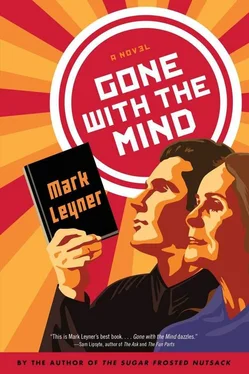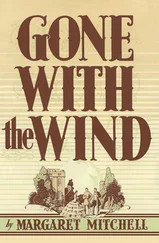Okay…just a little background before I get started: Gone with the Mind was originally going to be an autobiography in the form of a first-person shooter / flight-simulator game. And it was going to start at a breakfast meeting with my old editor Michael Pietsch during which I’m either assassinated or “commit suicide” in the men’s room. And my ghost has to travel back in time, revisit each transformative event in my life, and execute or otherwise degrade or disable the central dramatis personae in order to get to the next (prior) event. The, uh…the goal of the game is to successfully reach my mother’s womb, in which I attempt to unravel or unzip my father’s and mother’s DNA in the zygote, which will free me of having to eternally repeat this life. And I’m ferried from event to event by Benito Mussolini, who pilots a flying balcony. And along the way, he offers counsel and gaming advice kind of like Krishna in the Bhagavad Gita or like Virgil in Dante’s Inferno . And if the player succeeds in unknitting the entirety of his (my) life, thus flinging himself into utter oblivion, into an ontological black hole (or to put a more positive spin on it, reintegrating himself into the oceanic void), he wins.
I think an autobiography in the form of a first-person shooter game that ends with unraveling the zygote in your mother’s uterus sounds really cool, and Michael and pretty much everyone I mentioned it to also thought it sounded really cool, but what is that, actually? I mean, what would a book like that actually be, y’know? Once you start thinking about sitting down and actually writing something, it’s an entirely different matter. But I remained totally committed to doing it, because that’s just the kind of person I am — I’m not going to bail on something I said I was going to do. I think I’m a sort of exceedingly boring person (which certainly doesn’t make me the best candidate for an autobiography!)…I mean boring in that I’m very dutiful, very responsible…and if I say I’m going to write an autobiography in the form of a first-person shooter game that ends with unraveling the zygote in your mother’s uterus then I’m going to write an autobiography in the form of a first-person shooter game that ends with unraveling the zygote in your mother’s uterus, and that’s that. And I expect that of other people too, by the way. If you say you’re going to be in the schoolyard waiting for me in a certain place at a certain time, then be at that place at that time. Don’t send some proxy who doesn’t even know where the hell to wait, y’know what I mean? If you say you’re going to stay overnight with me at the hospital when I get my tonsils out, then stay overnight at the hospital, for God’s sake.
I said I’m an exceedingly boring person…I don’t really think that. I think I’m a sort of weird composite of thrill-seeking heedlessness and crippling hyperanxiety — I mean, I’ve taken LSD before a root canal, but I’m equally capable of calling the police and area hospitals if my wife is even five minutes late coming home from a pedicure, so…
At some point in this preliminary stage when I’m still just trying to figure out what this book could actually be, the Imaginary Intern appears…which changes everything. I was sitting on the toilet one morning, gazing down at the tiles on the bathroom floor, uh…just staring at the vein patterns and at the craquelure on this one particular tile, and I discerned a legible face…I discerned the lineaments of the Imaginary Intern in the craquelure of a tile on the bathroom floor. That’s exactly how the Imaginary Intern was conjured up. This is a textbook delusion of reference, specifically a pareidolia, a psychological phenomenon that involves seeing meaningful patterns, frequently faces, in random information — a common example of which is, um…something like seeing the face of Jesus in a Cool Ranch Dorito or something along those lines.
The Imaginary Intern initially functioned mainly as a kind of archivist or production manager on Gone with the Mind, helping me collate and categorize autobiographical material, but soon he became more like a, I don’t know…more like a coach or a trainer. Y’know that term in pharmacology, mechanism of action? It’s the specific biochemical interaction that basically enables a drug to do what it does. When you’re writing something, its mechanism of action is a very difficult thing to identify. It’s a very subtle, very elusive thing. But it really is the crucial fucking thing. And when I felt that I’d lost it, that I suddenly just didn’t know what it was…or when, y’know, I just felt kind of discouraged or dispirited about how it was all going, the Imaginary Intern would exhort me, he’d pump me up, y’know? He’d be, like, “Denzel Washington can land a plane upside down stinking drunk, and you can’t write an autobiography? A book about your own life? Are you fucking kidding me?”
So, quickly on, he became a very active collaborator with me, very much a creative partner, and the fundamental principles of the project, its…what’s that word?…its…its donnée, began to evolve quite rapidly.
I’m trying to think of a good way to describe the Imaginary Intern…um…He sort of reminded me of Billy Name, the guy who designed Andy Warhol’s Silver Factory on East Forty-Seventh Street back in the early sixties, the guy who pretty much functioned as the Factory’s foreman during its most fecund years…He was very earnest and forthright and affirmative in a sort of Jeff Koons / Ferris Bueller way…I’m not sure if any of this is really helping give you a sense of what the Imaginary Intern was actually like (and I’m going to talk more about him — and especially about when he left, which was a pretty big, traumatic deal for me — in a few minutes), but, for now…I mean…he was just a very friendly, very smart, upbeat, hardworking guy. Youthful, eager, open-minded, pragmatic…very much in sync with what I was thinking (obviously!) and very adept at devising practical solutions to notions that were fanciful or completely hypothetical. I was always struck by his antipathy for abstraction and how constantly he was on the alert for whatever smacks of mere theory as against the solidity and efficacy of worldly practice.
I’d wash a Klonopin down with a beer and sit on the couch and mute the TV, and I’d picture the Imaginary Intern and me just strolling down a long Brutalist concrete promenade leading to an abyss, walking and talking…
The Imaginary Intern could get very enthusiastic, very excited by our ideas, very animated, sometimes even a little strident, whereas I’d tend, as the night progressed, to become more and more recessive and sedate, and I’d sort of tilt my head and purse my lips and just listen. And I know sometimes that sort of bugged the Imaginary Intern. And one morning, after I woke up, I came downstairs and there was a note left on the couch in the Imaginary Intern’s handwriting:
Yes, it was late,
and, yes, I was being very
dented-in-the-head-mutant-hillbilly,
But you…
you just sat there
like some shitty poem.
And I remember thinking, That’s such a lovely line— “you just sat there / like some shitty poem.”
Once I said to the Imaginary Intern that reading about Achilles defiling the corpse of Hector gave me a hard-on. Do you think that makes me a fascist? I asked him. And he paused for what seemed like an eternity, and finally asked me if I knew that German soldiers on the front called crystal meth Panzerschokolade (which means “tank chocolate”), and we talked about how the world could be divided between people with sitzfleisch and people with shpilkes, and about how movies of a certain era used the donning of a frilly apron to signify how effete or inadequate a man was (for example, Jim Backus in Rebel Without a Cause or James Stewart in The Man Who Shot Liberty Valance ), and about how the government not only knows that there’s life after death, they know that life after death is fantastic, and they’re suppressing it, because they don’t want everyone finding out and immediately committing suicide, which would ruin the economy, and about how profoundly sad the lyrics to that old song “Red Rubber Ball” are (“The roller-coaster ride we took is nearly at an end / I bought my ticket with my tears, that’s all I’m gonna spend”), and we talked about the similar chemical composition of tears and seawater, of tears and great diluvial catastrophes, and about the tears of feckless, moribund men in frilly aprons, and how the brutal indifference of time was like a vast inexorable army of locusts, and how there’d been 10 26nanoseconds since the Big Bang…
Читать дальше












